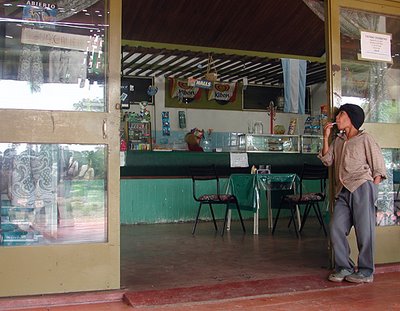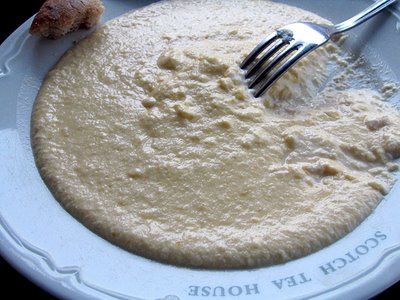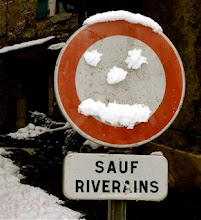skip to main |
skip to sidebar

I've become used to tagging words feminine with that "extra e":
Il est américain. Elle est américaine. He/She is american.
Il est grand. Elle est grande. He/She is tall.
Il est brun. Elle est brune. He/She is brown-haired.
L'exception: he and I are both jeune et mince (among other exceptionalqualities). No changes there - one "e", included for both.
So it "made sense" to me that in the passé composé I would have to add that "extra e":
Il est arrivé. Elle est arrivée. He/She arrived/has arrived/did arrive.Il est parti. Elle est partie. He/She left/has left/did leave.But it makes no sense to me that if the helping verb is "avoir" to have - that suddenly, the "extra e" is nowhere to be found:
Il/Elle a regardé. He/She looked/has looked/did look.
Il/Elle a mangé. He/She ate/has eaten/did eat.
I won't be surprised to find that "extra e" elsewhere ... hopefully, though in another language. One I'm conveniently not studying now. La photo (merci monsieur_foufou): Waiting somewhere in Misiones, Argentina. En Juin 2004.

I confess! When it comes to French grammar, I'm basically guessing. It's my way of building up intuition. Thinking grammar through is just not my forte. I just want to "know" what to say, say it and have it be right. I'd rather not torture my brain through analysis until minutes or hours later I can reason my way into a sentence that should be perfect... only to stumble into the l'exception pitfall. I don't have the patience for this and certainly the French, in my limited experience, don't want to witness the torture of their language either.
My teacher is explaining a few grammar points and pausing frequently to ask me if I understand. My answers go from the "uh-huh" of hopeful but questionable comprehension quickly to that of unquestionable incomprehension: "I guess... mmm... I guess..." My voice trails off wanting to stop guessing and instead think about other things: un gâteau au chocolat, Paris, l'amour...
What to learn from all of this? Today's vocabulary word: "I guess". My teacher paused, "hmmm... I guess would translate to je pense". Well, I may just start guessing everything à la française because thinking is better than "just" guessing, isn't it? Hmm, je pense...
the French we already know:
le fort forte (specialty)
l'analyse (fem) analysis
l'exception (fem) exception
la patience patience
l'expérience (fem) experience
la compréhension comprehension
l'incompréhension (fem) incomprehension
penser to think, to guess
un gâteau au chocolat chocolate cake
l'amour (mas) love
La photo: Guess what? It's supposed to be œufs brouillés!
(It could pass for my brain on grammar though...)
Au Scotch Tea House, à Nice. Juin 2006

After my short holiday from learning French mutated into an extended strike - how fitting is it that my first lesson upon return is about l'imparfait?
The imperfect is not only the lapsed débutante de français, moi - but the French past tense that wants you to know there's a another reason to learn the nous and vous verb forms in the present tense.
I hadn't been bothering to completely conjugate all the verbs that I've been learning. I can speak for myself: Je parle anglais. I can turn a simple sentence into a question for my teacher: Parles-tu anglais? (in the familiar because, oui, je tutoie!). I can also tell you about somebody, he or she as easily as "je": il parle/elle parle/on parle anglais! (tu also likes sharing verb forms with je on many occassions.)
I was basically content to stumble when conjugating the nous and vous forms because they rarely came up. That is, until I took a trip into the French imperfect past. Suddenly they are the foundation upon which habits and states of beings are built - just replace the endings in the nous or vous present form:
parler = nous parlons, vous parlez we speak, you (formal) speak
boire = nous buvons, vous buvez we drink, you (formal) drink
(je bois, tu bois, il/elle/on boit, ils/elles boivent)
with the proper imperfect endings:
je parlais I was speaking, I used to speak
tu parlais
il/elle/on parlait
nous parlions
vous parliez
ils/elles parlaient
je buvais I was drinking, I used to drink
tu buvais
il/elle/on buvait
nous buvions
vous buviez
ils/elles buvaient
Of course there are exceptions... but that's when memorizing and quizzing yourself can help. Like I now have to, too. Being imperfect isn't easy.
La photo: Street Art à San Antonio, Texas. Octobre 2004.







